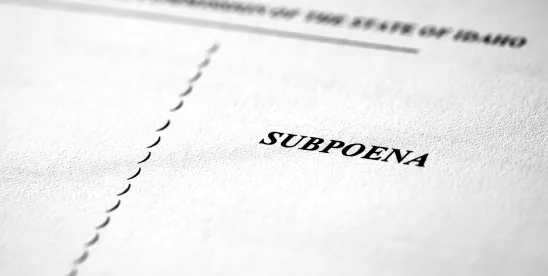On October 30, 2024, in Alternative Global One, LLC v. Feingold, the New Jersey Appellate Division affirmed a trial court’s orders denying a New Jersey litigant’s motion to quash a subpoena for his deposition in underlying Florida litigation to which he was not a party.
This decision illustrates that a litigant, even a non-party, must do more than assert blanket, unsubstantiated objections to a subpoena ad testificandum.
The appeal arose from a Florida litigation. In Alternative Global One, LLC v. Feingold, No. 2023-000688-CA-01 (Fla. Cir. Ct. filed Jan. 17, 2023), plaintiffs Alternative Global Companies filed suit against defendants David Feingold and Michael Dazzo, alleging breach of fiduciary duty, civil theft, conversion, replevin, tortious interference, civil conspiracy, accounting, and unjust enrichment. Along with Richard Cardinale, defendants served as co-managing members of the Alternative Global Companies. But after their resignation, defendants allegedly “attempt[ed] to convert [certain investments] from the Alternative Global Companies to their own benefit” and refused to surrender corporate books and records that they maintained. Pursuant to Rule 4:11-4(b), plaintiffs served a subpoena ad testificandum on appellant Daniel W. Amaniera, who was not a party to the litigation, seeking only to depose him in New Jersey.
Amaniera moved to quash the subpoena and for a protective order in the Superior Court of New Jersey. Denying any direct relationship with plaintiffs, Amaniera certified that Cardinale was attempting to harass him and seek confidential information related to an entity with which he was presently affiliated. An affidavit attached to the certifications of Amaniera’s attorney delineated Amaniera’s relationship and dealings with Cardinale. In opposition, plaintiffs’ submissions included “[d]ocuments referencing [Amaniera]”; affidavits of investors “testif[ying] about their dealings with and knowledge about [Amaniera], defendants, plaintiffs, and Cardinale”; and “a joint case management report” in which “the parties identif[ied] [Amaniera] as a fact witness.” Following the trial court’s order and amended order denying his motion, Amaniera appealed to the Appellate Division, protesting that the subpoena was harassing, the subpoena sought duplicative and irrelevant information, and the trial court misapplied the factors set forth in Berrie v. Berrie, 188 N.J. Super. 274, 284 (Ch. Div. 1983).
The Appellate Division jettisoned Amaniera’s arguments. Quoting Berrie, the court noted “a nonparty deponent may not assert lack of relevancy or materiality” as the nonparty “has no real interest in the outcome of the pending litigation.” Despite Amaniera’s assertions that there was no reason for his deposition and the deposition sought irrelevant information, the court reasoned the parties’ identification of him as a fact witness, his affidavit, the investors’ affidavits, and his merits brief concession of his “limited involvement and communications with investors” all belied his assertions. The court also determined the discovery rules entitled plaintiffs to “explore,” in a deposition, Amaniera’s merits brief contention that he did not communicate any information relating to the claims in the underlying litigation to the investors and lacked direct knowledge of the underlying facts. Citing Rule 4:11-4(b), the court further discerned no merit to Amaniera’s harassment claim because the rule “d[id] not require the party seeking the deposition to identify ‘the areas of anticipated questioning.’”
Amaniera’s “blanket assertion” that the deposition would seek confidential information fared no better. The court found his assertion “equally speculative and unsupported,” and noted plaintiffs’ willingness to enter into a confidentiality order even assuming his concern was legitimate. Moreover, the court rejected Amaniera’s argument that he could not give any testimony that Cardinale would not have already known because Rule 4:10-2(a) provided “it is not ‘ground for objection that the examining party has knowledge of the matters as to which discovery is sought.’” Nor was the court persuaded Amaniera substantiated his claims that the deposition was duplicative or there were less burdensome ways to acquire the information. Accordingly, determining that the trial court did not abuse its discretion or misapply the law, the court affirmed.
This much is clear from Amaniera’s appeal: a litigant, even a non-party, cannot simply sling blanket assertions at a subpoena ad testificandum by claiming it was harassing, duplicative, burdensome, and irrelevant; instead, the non-party must substantiate his or her claims in seeking a motion to quash a subpoena and for a protective order.



 />i
/>i
